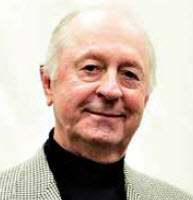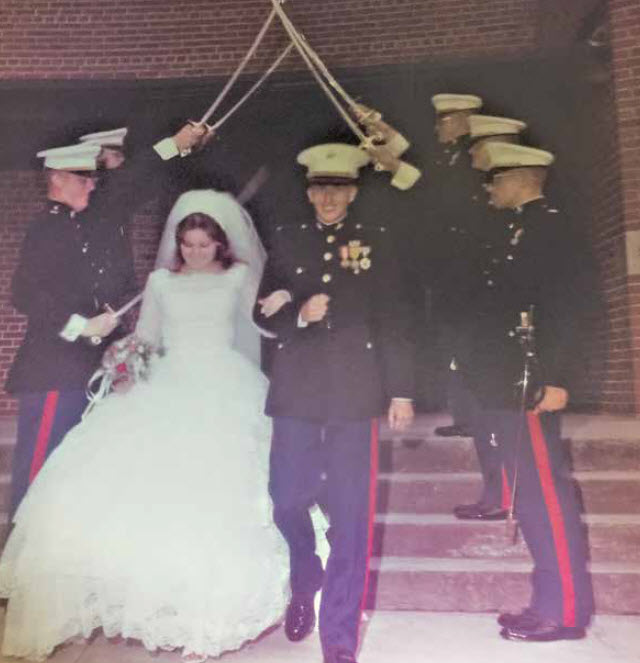 By: Jerry Barksdale
By: Jerry Barksdale
May 7, 1983. Camp LeJeune, N.C.
His sea bags were packed. Tomorrow morning – Mother’s Day – he would depart home. Captain William E. “Bill” Winter, age 32, loved the Marine Corps, but leaving home and family was never easy. After all, he never knew if he would return. His two children, Michael, age 6, and Amanda, age 2 ½, were in bed. He reached up and pulled Melia, his wife of 7 years, onto his lap and held her. He turned serious. “If anything happens to me, I want you to remarry,” he said. She made light of it. “Nope, once is enough for me.”
“No, I’m serious. The kids need a daddy and you need a husband.”
Mother’s Day morning, Winter backed out of his driveway, paused, took a final look at his home, then drove off into a fine North Carolina spring morning.
This would be his second trip to the Mediterranean, this time with the 1st Battalion, 8th Marines, part of a multinational peacekeeping force stationed in Beirut, Lebanon. Once known as “Paris of the Middle East” because of its cultural and intellectual life, the once beautiful city jutted out like a thumb into the blue Mediterranean Sea. Now, it was a deadly battleground between warring Christians and Muslims with bombed out buildings, shell-pocked streets and frightened citizens caught up in the violence. Iran and Syria were stirring the turmoil. The Marines would act as peacekeepers. They would go there in peace.
Captain Winter, the only child of Ellis and Virginia (Balch) Winter (retired Montesano scientist and school teacher respectively, of Capshaw, Alabama) was a Marine to his core. Following graduation from Auburn University in 1973 with a Bachelor of Science Degree, he joined the Marine Corps and was commissioned a 2nd Lieutenant. After completing Parachute and Ranger Training at Ft. Benning, Georgia, he was assigned to the 3rd Marine Division in Okinawa. Later, he was stationed at Parris Island, South Carolina.
That’s where he met Melia Redding, the pretty, brown-eyed daughter of Major H.L. Redding, a tall, poker straight retired Marine. Major Redding was managing the Navy Federal Credit Union following 23 years in the Corps. A highly decorated Marine, Redding had enlisted following high school in 1950 and sent to Korea where a war was raging. A land mine darn near killed him, sending him to a hospital for 18 months. Afterwards, he served in President Eisenhower’s Honor Guard and made trips to Camp David, the presidential retreat. Later, he served in Vietnam.
The youngest of his two daughters, Melia didn’t wear Marine olive green nor the eagle, globe and anchor on her collar tab, but she was born and bred a Marine. In fact, she was born in 1957, in Alexandria, Virginia, not far from Marine Headquarters where her father worked.
Melia met the handsome, young Lt. Captain Winter on a blind date in January, 1976. A friend who worked for her father at the Credit Union set it up. Melia, half joking said, “I want a single officer that doesn’t smoke, drink or curse…and has lots of money.” She recently told me, “I was just messing around. What are the odds of getting all that?” Prior to asking her out, Winter went to the Credit Union, met her father and asked his permission to take her out. “Who does that?” Melia asked me as we sat in her living room not far off Menefee Road. “Nobody! He did.”
He picked her up in a fairly new Cutlass Supreme and took her to see Three Days of the Condor. “It turns out,” says Melia, “he had gone to the movies the night before to see it and make sure it was presentable to take me to see it.” She adds, “He was a wonderful Southern gentleman.”
Winter called her, but not regularly because of his job. They dated in January, went out in February, once in March and then began dating steady in April.
“In May, 1976, he asked me to marry him, but he asked my dad first.”
America celebrated its 200th Birthday on July 4, 1976. Six days later, Melia and Captain Winter married at the Base Chapel on Parris Island. “It was a bicentennial wedding,” she calls it. She wore a white Southern belle gown with hoops and held a bouquet of red and white flowers that matched her husband’s dress blues and white cover. They exited the Chapel happy and in love beneath two rows of Marines holding sabers over their head.
One year and a day later, Michael was born at the Naval Hospital in Beaufort. In 1978, they went to Cornwall, England for 2 years where Bill served at a nuclear facility. Amanda was born while there.
It seemed only yesterday they exited the wedding chapel, happy and laughing with no worries. Now Bill was 6,000 miles away in Beirut. Melia wouldn’t see him again until Thanksgiving. She missed him terribly. And she worried. But she had two young children to raise and that filled a big void in her soul. She drove down to Beaufort, South Carolina, and visited her parents and that was good. Not only could she assist them, they could help her with the children.
Bill wrote regularly, sometimes daily, always addressing his letter to “Melia Michael, and Mandy” and never failing to ask about the children. It was hot in Beirut, and he didn’t sleep well on his narrow cot with no mattress. He was lonely and counting the days. “I wish time would go faster… I miss you terribly…….142 days to go. I love you with all my heart,” he wrote. When off duty he built model military vehicles and read. He’d just finished Follow the River and was starting another book. Then bad luck came calling on the morning of July 22. Eight, 120mm mortar rounds slammed into the Marine compound. One Marine caught shrapnel. “Glad you’re not here,” he wrote. “But sure wish I was there.”
Bad luck travels in pairs. On the same day in Beaufort, South Carolina, at around 9:30 p.m., lightning struck the Redding residence and it burned to the ground. Melia, the children, her parents and 3 dogs barely escaped with their lives. Everything was destroyed, including Melia’s wedding ring. Aside from his own safety, Bill now had something else to worry about – his family back home.
Her father rented a beach house on nearby Fripp Island and Melia and the children stayed with them. “I did a lot of walking on the beach,” she says. “I would look across the Atlantic Ocean and think, he’s straight across there somewhere.” And Winter was missing her and the children, and counting the days until he could go home. If everything went well, he’d be home for Thanksgiving. He had recently sent roses to Melia.
“If I could afford it,” he wrote her, “I’d send roses everyday of our life because you are the rose of my life. He promised her they would go shopping for a wedding ring when he got home. The nearby Beirut Airport came under attack and Pan Am stopped flying. Mail slowed to a trickle. On July 23, he wrote Melia that he had finished reading Centennial and had started Hawaii… “lot of shooting up in the hills… 137 days left.” To add more misery to his life, Winter got “really sick” with food poisoning. “Beirut Boogie,” he called it, “stomach cramps and diarrhea 12-13 times a day.” “I need you to hold on to,” he wrote. Attending church was helpful. “The mosquitoes eating me up tonight… It won’t be long until we’re together again.”
Winter always asked about his children. “Tell Michael, he’s doing real well with his writing. I’m proud of him and of you teaching him. I know Mandy will do as well when she gets older.”
Islamic terrorists turned up the heat on Sunday, August 31, at 3 p.m. “Things started to fall apart…we took incoming for several hours…Monday it got much worse,” he wrote. “One round hit outside the mess tent and one hit the tent of Lt. Losey and S/Sgt. Ortega, the former killed instantly. Ortega died in route to the ship. We ended with 14 WIA and 2 KIA.”
Winter’s letters told of more attacks, shelling, wounded and dead Marines. His Auburn friends hadn’t forgotten him. Becky Arrington, one of Bill’s former classmates and President of the Houston Area Auburn Club, sent him an American flag. He hoisted it atop the Lebanese University Library where a company of Marines were stationed.
On September 7, Winter wrote, “2 more Marines killed in Company A…round blew them to pieces…we are getting hit every day and night. We keep hearing that the majority of folks in the U.S. want us to pull out. Wrong answer. We can’t quit and go home because of a bunch of terrorists. We have to stand up and be counted sooner or later. Better here than at home 20 years from now.” His prophesy was off by only two years. Terrorists brought down the Twin Towers 18 years later, almost to the day.
By: Jerry R. Barksdale
www.jerrybarksdale.net fb.com/jerry.barksdale.7






